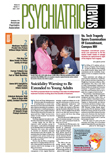Some guidelines on how to identify young children who might have autism are contained in a new report issued by the Centers for Disease Control and Prevention and the Interdisciplinary Council on Developmental Learning Disorders.
Notably, the report includes a number of questions that a pediatrician might ask the parents of an infant or young child to determine whether it shows signs of autism and thus need a formal evaluation.
For an infant of three months, for example, the pediatrician might ask:“ Does your baby look toward you when you are talking?” or“ Are you able to calm your baby?” For an infant of five months, a pediatrician might ask: “Is your baby usually happy and smiling and making interesting sounds when he or she sees you?” For a 1 year old, a doctor might ask: “Does your baby initiate interactions with sounds or smiles, then respond with more sounds or smiles after you respond? And for a 2 year old, a clinician might ask: “Does your toddler use words to let you know what he wants or what he is feeling?”
Such questions, the report states, reflect healthy developmental milestones in infants and young children. Moreover, results from two studies showed that responses to such questions could discriminate between children with no developmental challenges and children with them and could also predict later functioning.
And if, after posing such questions, a pediatrician decides that a child should have a formal evaluation, then the evaluation should be comprehensive, the report emphasizes. It should include assessments in social, emotional, cognitive, language, motor, and sensory domains. It should also examine interactions within the child's family and look into the availability of community support in the event that the child has autism.
“This report is important to the future of children and families all over the country,” T. Berry Brazelton, M.D., said in a prepared statement accompanying release of the report. Brazelton is a professor of pediatrics emeritus at Harvard Medical School and a member of the working group that put the report together. “We know that the earlier in childhood—or even infancy—treatment begins, the more likely people affected by autism can adapt to society and the workplace.”
"CDC/ICDL Collaboration Report on a Framework for Early Identification and Preventive Intervention of Emotional and Developmental Challenges" is posted at <www.icdl.com>.▪
